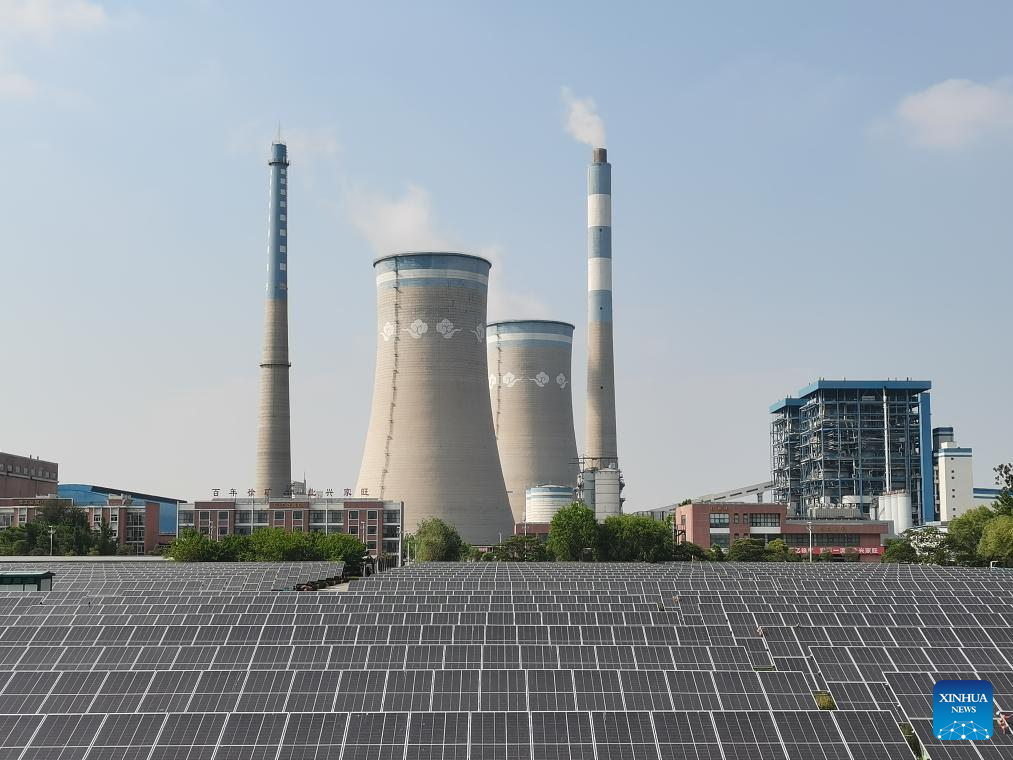
This photo taken on May 22, 2024 shows photovoltaic panels in Jiangsu Huamei thermoelectricity company in Xuzhou, east China's Jiangsu Province. T (Xinhua/Jiang Wenqian)
NANJING, Aug. 2 (Xinhua) -- The city of Xuzhou in east China's Jiangsu Province has historically been an industrial city, serving as a prominent supplier of coal to the Yangtze River Delta region.
However, the coal mining activities in Xuzhou caused severe air pollution due to coal ash and dust. Locals even joked that if a sparrow flew through Xuzhou, it would turn into a crow.
Coal resources later became depleted, resulting in Xuzhou's economy losing much of its vitality. Many young people left the city to seek employment opportunities elsewhere, while those who stayed had to face the consequences of a damaged environment.
Mining activities caused land subsidence in Xuzhou, rendering approximately 423,300 mu (about 28,220 hectares) of land unsuitable for farming. During the rainy season, people once used trenches caused by land subsidence to raise fish and shrimp.
In recent years, Xuzhou has focused on green development and made significant progress in transforming and upgrading its traditional industries. This includes reducing energy consumption and eliminating polluting chemical enterprises, resulting in a cumulative decrease of 34.5 percent in energy consumption per unit of its GDP.
Jiawang District, in particular, has implemented more than 80 projects to address land subsidence. The most severely affected area has now been transformed into Pan'an Lake National Wetland Park. This park boasts about 160,000 plants of various species. The improved ecological environment has attracted numerous bird species, including the endangered reed parrotbill, to the wetland.
Industrial waste disposal, especially hazardous waste, when not properly managed, can further damage the ecological environment. Therefore, Xuzhou has been developing the circular economy and other green industries to meet its environmental protection needs, while also fostering new economic growth drivers.
At the Xuzhou Lyu'yuan Zhongtian solid waste disposal company, a high-temperature rotary kiln can effectively treat and remove hazardous waste, with certain components being reused.
The company is also exploring opportunities in the recycling business within the new energy vehicle industry. The technologies used in processing waste lithium battery electrolyte help prevent equipment corrosion caused by fluorine electrolyte burning, said Chen Nian, a senior technician of the company.
Currently, Xuzhou is constructing a key project -- the circular economy industrial park, with the aim of becoming a "zero-waste city" and having an annual waste treatment capacity of 1 million tonnes. The park is equipped with garbage sorting machines that can quickly identify recyclable plastic bottles, while converting food waste into feed within minutes.
Meanwhile, the city is also actively exploring green energy solutions, venturing into new sectors such as the big data industry.
Jiangsu Huamei thermoelectricity company, a subsidiary of Xuzhou Coal Mining Group, has built a demonstration zone for the photovoltaic industry on the former site of a coal mine.
This demonstration zone showcases various applications of photovoltaic products, such as using tempered glass to create a protective glass wall for the water corridor and embedding photovoltaic panels in floor tiles to generate electricity for nighttime lighting. The photovoltaic roof in its parking lot allows employees to charge their vehicles during one working day, which is enough to meet their commuting needs for an entire week.
"We utilize combined heat and power technology to capture waste heat from power generation and convert it into hot water or steam. This energy is then transported to residential areas during winter through a heat pipe network, providing heating services to approximately 1.5 million residents," said Zheng Hong, the company's general manager.
Furthermore, the company converts high-temperature steam from the power plant into energy through a refrigerating unit, which is used to cool the server room. This has persuaded numerous science and technology companies as well as local government departments to establish data centers in the area.
The determination and success of Xuzhou combine to provide valuable experience and serve as an example for China as a whole, with the country committed to the dual carbon goals of peaking carbon emissions by 2030 and achieving carbon neutrality by 2060. ■

This photo taken on May 21, 2024 shows a view of Pan'an Lake National Wetland Park in Xuzhou, east China's Jiangsu Province. T (Xinhua/Jiang Wenqian)



